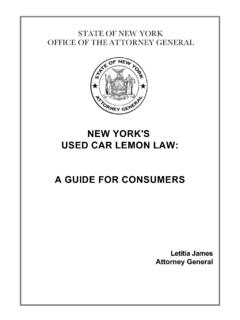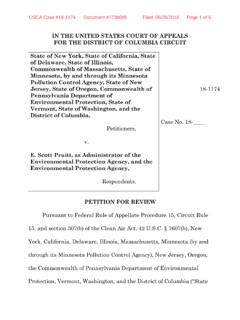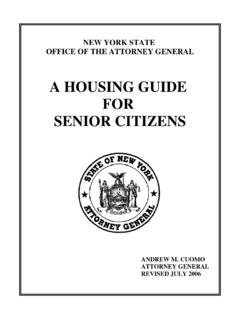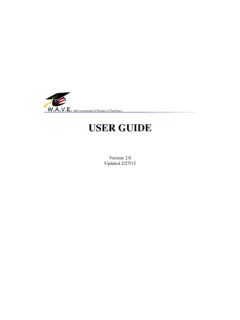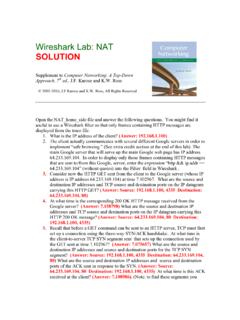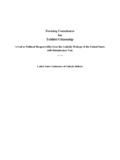Transcription of INTRODUCTION - ag.ny.gov
1 Case 6:21-cv-06303-FPG Document 68 Filed 12/13/21 Page 1 of 46. UNITED STATES DISTRICT COURT. WESTERN DISTRICT OF NEW YORK. EMILEE CARPENTER, LLC, et al., Plaintiffs, Case # 21-CV-6303-FPG. v. DECISION & ORDER. LETITIA JAMES, et al., Defendants. INTRODUCTION . Our nation was founded on a principle of inherent equality that it is not merely true, but self-evident, that all men are created equal and endowed by their Creator with certain unalienable Rights, including Life, Liberty, and the pursuit of Happiness. Adarand Constructors, Inc. v. Pena, 515 200, 240 (1995) (Thomas, J., concurring in part and concurring in judgment).
2 Historically, it is an aspiration that has been subject to a variety of caveats, restrictions, and provisos when applied to certain groups, persons, and classes. But it is also an aspiration that could not forever tolerate such limitations. City of Mobile v. Bolden, 446. 55, 104 (1980) (Marshall, J, dissenting). Throughout our history, Americans have struggled and suffered in order to extend that principle of equality to the excluded, armed with the belief that our society should fully reflect our most cherished values. The Supreme Court's landmark decisions memorialize the necessary, but oftentimes painful, process of reconciling our values and our practices.
3 See Brown v Bd. of Educ. of Topeka, Shawnee Cnty., Kan., 347 483 (1954);. Loving v. Virginia, 388 1 (1967); v. Alabama, 511 127 (1994); Lawrence v. Texas, 539 US 558 (2003); Obergefell v. Hodges, 576 644 (2015). It is a necessary process, one which is contemplated by our Constitution. Obergefell, 576 at 664 ( The generations that 1. Case 6:21-cv-06303-FPG Document 68 Filed 12/13/21 Page 2 of 46. wrote and ratified the Bill of Rights and the Fourteenth Amendment did not presume to know the extent of freedom in all of its dimensions, and so they entrusted to future generations a charter protecting the right of all persons to enjoy liberty as we learn its meaning.)
4 As it has elsewhere, this process has unfolded in the arena of the public marketplace. Since the end of the Civil War, states and localities have enacted and expanded legislation to ensure that historically underserved, disfavored, or disadvantaged classes of persons have the same access to the American marketplace's great bounty as that afforded to the public at large. Without such access, private discrimination in the marketplace could perpetuate a caste system in the United States, Bell v. Maryland, 378 226, 288 (1964) (Goldberg, J., concurring), preventing certain groups from achieving prosperity, health, development or happiness.
5 Gibbs v. Arras Bros., 222. 332, 336 (1918). The Supreme Court has repeatedly and unequivocally found that such legislative efforts serve valid, and indeed compelling, interests, including in the context of sexual orientation discrimination. At bottom, these laws simply seek to guarantee that businesses purporting to serve the public truly do serve the public. [G]ay persons and gay couples are a part of that public. Masterpiece Cakeshop, Ltd. v. Colorado Civil Rts. Comm'n, 138 S. Ct. 1719, 1727 (2018). Therefore they, like all other members of the public in the marketplace, are entitled to be treated in a manner consistent with their inherent equality, dignity[,] and worth.
6 Id. With all this in mind, the Court turns to the present dispute. 2. Case 6:21-cv-06303-FPG Document 68 Filed 12/13/21 Page 3 of 46. Plaintiffs are Emilee Carpenter and the entity through which she operates her for-profit wedding-photography business, Emilee Carpenter, LLC. 1 Plaintiff brings this civil rights action pursuant to 42 1983, arguing that, as applied to her business, New York's public- accommodations laws compel her to violate her conscience by professing the state's [favorable]. view about [same-sex] marriage. ECF No. 1 at 3. She seeks declaratory and injunctive relief against Defendants Letitia James (in her official capacity as the Attorney General of New York), Jonathan J.
7 Smith (in his official capacity as Interim Commissioner of the Division of Human Rights ( DHR )), 2 and Weedon Wetmore (in his official capacity as District Attorney of Chemung County, New York). Currently before the Court are three motions: (1) Plaintiff's motion for a preliminary injunction (ECF No. 3), (2) Wetmore's motion to dismiss under Rule 12(b)(1). (ECF No. 24), and (3) the State's motion to dismiss under Rules 12(b)(1) and 12(b)(6) (ECF No. 27). The motions have been fully briefed, and the Court has also received amicus briefs from dozens of entities and organizations. 3 The Court thanks all involved for their thorough 1.
8 Except where context dictates otherwise, the Court refers to Emilee Carpenter and Emilee Carpenter LLC as Plaintiff.. 2. The Court refers to James and Smith collectively as the State.. 3. These entities include: the States of Nebraska, Alabama, Arkansas, Kansas, Kentucky, Louisiana, Mississippi, Missouri, Montana, Oklahoma, South Carolina, Texas, Utah, and West Virginia (ECF No. 22); the New Yorker's Family Research Foundation and New Yorkers for Constitutional Freedoms (ECF No. 23); the Coalition of African American Pastors, Conservative Clergy of Color, Frederick Douglass Foundation, and the Restoration Project (ECF. No.)
9 50); New York Civil Liberties Union and American Civil Liberties Union (ECF No. 51); Americans United for Separation of Church and State, Anti-Defamation League, Bend the Arc: A Jewish Partnership for Justice, Central Conference of American Rabbis, Global Justice Institute Metropolitan Community Churches, Hindu American Foundation, Men of Reform Judaism, Methodist Federation for Social Action, National Council of Jewish Women, New York Conference United Church of Christ, Reconstructionist Rabbinical Association, Union for Reform Judaism, and Women of Reform Judaism (ECF No. 52); and the States of Massachusetts, California, Connecticut, Delaware, Hawaii, Illinois, Maine, Maryland, Michigan, Minnesota, Nevada, New Jersey, New Mexico, North Carolina, Oregon, Pennsylvania, Rhode Island, Vermont, Virginia, and Washington, and the District of Columbia (ECF No.
10 55). 3. Case 6:21-cv-06303-FPG Document 68 Filed 12/13/21 Page 4 of 46. submissions. The magnitude of these briefs, coupled with the passion with which their positions are articulated, demonstrate the importance of the issues under discussion. For the reasons that follow, Wetmore's motion is DENIED; the State's motion is GRANTED insofar as all claims are dismissed with prejudice for failure to state a claim upon which relief may be granted; the Court sua sponte dismisses with prejudice the claims against Wetmore for failure to state a claim upon which relief may be granted; and Plaintiff's motion for a preliminary injunction is DENIED AS MOOT.





